|
|
|
Sort Order |
|
|
|
Items / Page
|
|
|
|
|
|
|
| Srl | Item |
| 1 |
ID:
137374
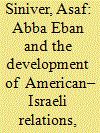

|
|
|
|
|
| Summary/Abstract |
Abba Eban, Israel’s ambassador in Washington and representative at the United Nations from 1950 to 1959, had a central role in the transformation of American–Israeli relations during a period of frequent discord over key strategic issues. This analysis examines the influence of one prominent actor upon bilateral ties that would eventually become the American–Israeli “special relationship.” Eban’s oratory talent, linguistic skills, and effective style of diplomacy augmented both Israel’s image in the view of the American public and relations with official Washington. The article explores several critical elements of these relations during the 1950s, re-examining both Eban’s involvement in events such as Israel’s approach toward the problem of borders, its policy of military retaliation, and the response to severe American pressure following the 1956 Sinai campaign. Whilst not attributing the development of close relations between the two Powers solely to the works of a single individual, evidence suggests that Eban was the right man in the right place and time to provide the necessary foundations for the elevation of American–Israeli relations to “special” in the following decade.
|
|
|
|
|
|
|
|
|
|
|
|
|
|
|
|
| 2 |
ID:
133777
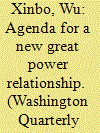

|
|
|
|
|
| Publication |
2014.
|
| Summary/Abstract |
Well begun is half done," Aristotle once said, meaning that beginning a project well makes it easier to do the rest. Yet, this may not be true of China-U.S. relations during Obama's presidency. Although the Obama administration secured a smooth transition from the George W. Bush years and attached high priority to relations with China during its first year in office, bilateral relations turned downward over the rest of Obama's first term, leaving a legacy of growing mutual suspicion and rising competition between the two countries, especially in the Asia-Pacific region. In spite of the November 2009 bilateral agreement to build a "positive, cooperative, and comprehensive relationship,"1 the two sides missed opportunities for more cooperation while mishandling and even misguiding bilateral ties on some points.
|
|
|
|
|
|
|
|
|
|
|
|
|
|
|
|
| 3 |
ID:
133482
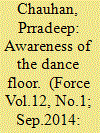

|
|
|
|
|
| Publication |
2014.
|
| Summary/Abstract |
As the world entered the last couple of decades of the 20th century, the sharply differing views and reactions of India and the United States (US) to unfolding global and regional events had brought bilateral relations to almost the nadir of the Nixon years. As James Heitzman and Robert L. Worden, the Washington-based editors of India: A Country Study have recorded (http://www.countrystudies.us/india/134.htm), "In the 1980s the Indian and United States governments had divergent views on a wide range of international issues, including Afghanistan, Cambodia, the Middle East, and Central America. Serious differences also remained over the US policy toward Pakistan and the issue of nuclear proliferation. India was repeatedly incensed in the Eighties when the US provided advanced military technology and other assistance to Pakistan despite the US' concerns about Pakistan's covert nuclear programme. For its part, Washington continued to urge New Delhi to sign the Treaty on the Non-Proliferation of Nuclear Weapons and, after the successful test launch of the Indian Agni intermediate-range ballistic missile in May 1989, called on New Delhi to refrain from developing a ballistic missile capability by adhering to the restrictions of the Missile Technology Control Regime". This unhappy prelude makes the vibrancy of the India-US bilateral defence relationship in general (and the maritime relationship in particular) over the very next decade all the more striking.
|
|
|
|
|
|
|
|
|
|
|
|
|
|
|
|
| 4 |
ID:
129534
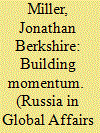

|
|
|
|
|
| Publication |
2014.
|
| Summary/Abstract |
There is clear recognition in both Moscow and Tokyo that a Sino-centric continent is not in their interests. Russia and Japan are obliged to recalculate their strategies in order to adapt for a future geopolitical realignment in Asia. Both sides recognize the stakes and that the rules of the game are no longer static.
Amid debate about a renaissance of U.S. power in Asia, Russian President Vladimir Putin has been thinking about his own "pivot" or "rebalance" to the Far East. Russia has always maintained its historical legacy as a Pacific power, but realistically this has largely been ignored for decades. Japan meanwhile has been challenged vigorously this past year by China, and to a less extent, South Korea and Russia, on its territorial disputes. This, coupled with China's increased assertiveness on security policy in the region, has created an environment with new challenges that Japan, the U.S. and Russia must confront. Japan and Russia especially are facing an uncertain future as Asia continues to morph into the most strategically important region in the world.
|
|
|
|
|
|
|
|
|
|
|
|
|
|
|
|
| 5 |
ID:
146555
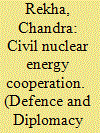

|
|
|
| 6 |
ID:
126692


|
|
|
|
|
| Publication |
2013.
|
| Summary/Abstract |
Zachary K. Goldman and Mira Rapp-Hooper discuss American security interests in the Persian Gulf region and the prospects for effective cooperation among Gulf States to contain Iran. They ?nd that it is unlikely that the United States will be able to establish a containment regime that relies upon the Gulf Cooperation Council and that informal, bilateral ties to states in the region are a preferable policy recourse.
|
|
|
|
|
|
|
|
|
|
|
|
|
|
|
|
| 7 |
ID:
129407
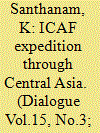

|
|
|
|
|
| Publication |
2014.
|
| Summary/Abstract |
In a global milieu where traditional interstate diplomacy is often forced to underplay critical dynamics such as the role of culture, education, entrepreneurship and tourism in bilateral ties, there is a need to establish other channels of communication and interactions between States. These are not seen as alternatives but as complementary modules for enhancing cooperation between States. The India Central Asia Foundation's (ICAF) expedition through Central Asia covering the three countries of Kazakhstan, Kyrgyz Republic and Uzbekistan qualifies as a worthy endeavour premised on this principle of Track II diplomacy. The driving expedition was organised by the ICAF during September 18 - October 05, 2013. The 16-member expedition covered 5700 km in three countries - Kazakhstan, Kyrgyz Republic and Uzbekistan in 18 days. The team brought various skills to the venture, from knowledge of the history of
the places to politics and economics. It included people who could speak the local languages. The members left New Delhi on September 18, 2013 by Air Astana and reached Astana via Almaty the same day at 21:30 hrs (Kazakhstan time). During the seven day expedition in Kazakhstan, the destinations covered were Astana, Karaganda, Balqash, Taldyqorgan, Jarkent, Khorgos (including Khorgos in Xinjiang province of China also) and Almaty. The next three days (Sept 25-27) were spent in Bishkek and Osh in the Kyrgyz Republic. We covered Andijon, Ferghana, Kokand, Tashkent, Samarkand, Bukhara, Khiva (Khwarizm) and Urgench in Uzbekistan during the next 8 days.
|
|
|
|
|
|
|
|
|
|
|
|
|
|
|
|
| 8 |
ID:
142875
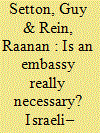

|
|
|
|
|
| Summary/Abstract |
Spanish–Israeli relations expanded across numerous fields throughout the 1960s despite the absence of formal diplomatic ties. For all practical purposes, Israel’s Ministry of Foreign Affairs had a legation in Madrid during the second half of the 1960s, including at least 3 semi-official representatives operating with the full knowledge of Madrid. Clandestinely, a Mossad station worked in liaison with the local intelligence services. Absence of a full-fledged Israeli embassy did not prevent advancing bilateral ties, normalising Jewish affairs in Spain, or preventing both Powers from engaging in official and public occasions or behind the scenes. Systemic pressure, most evident in Madrid’s ascension to GATT, and the need to abide with its rules by liberalising trade with Israel did much to advance Spanish–Israeli bilateral ties in the 1960s. A strong systemic external force also brought change in their relations in the 1980s. The diplomatic breakthrough of January 1986 and establishment of full formal diplomatic relations between the Powers was largely the inevitable result of Spain’s entry into the European Economic Community.
|
|
|
|
|
|
|
|
|
|
|
|
|
|
|
|
| 9 |
ID:
137476
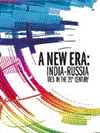

|
|
|
|
|
| Publication |
Moscow, Rossiyskaya Gazeta, 2015.
|
| Description |
174p.Hbk
|
| Standard Number |
9780988841932
|
|
|
|
|
|
|
|
|
|
|
|
Copies: C:1/I:0,R:0,Q:0
Circulation
| Accession# | Call# | Current Location | Status | Policy | Location |
| 058180 | 327.540947/FET 058180 | Main | On Shelf | General | |
|
|
|
|
| 10 |
ID:
131592
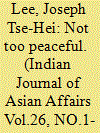

|
|
|
|
|
| Publication |
2013.
|
| Summary/Abstract |
Much attention has been paid to China's determination to exert its in?uence over the East and South China seas using both political and military power. The final ?ew weeks of 2013 saw a rapid deterioration of the diplomatic goodwill that China had built with its maritime neighbours over the past several decades, threatening regional stability and risking an arms race with the U.S., Japan, and Southeast Asia. This article draws on some snapshots of the latest sovereignty disputes in the East and South China seas and the bilateral ties across the Taiwan Strait to discuss the continuities and breakpoints in China "s strategic outreach in a multipolar world. It argues that the ability of China to pursue security interests in its maritime ?rontiers is largely contingent upon many circumstantial factors.
|
|
|
|
|
|
|
|
|
|
|
|
|
|
|
|
| 11 |
ID:
095409
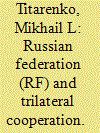

|
|
|
| 12 |
ID:
170720
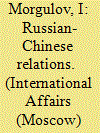

|
|
|
| 13 |
ID:
134212


|
|
|
|
|
| Publication |
2014.
|
| Summary/Abstract |
The paper analyses Greece's relations with China and highlights the crucial role of specific business interests in strengthening bilateral ties. Greek-Chinese political contacts, as well as trade, investment and touristic flows, have significantly increased in the last decade. The concession of the Piraeus port to the Chinese company COSCO was the major turning point for the relationship. The paper notes a strong influence of shipowning interests in Greece's foreign policy decision-making system which has conditioned the development of Greek-Chinese relations.
|
|
|
|
|
|
|
|
|
|
|
|
|
|
|
|
|
|
|
|
|